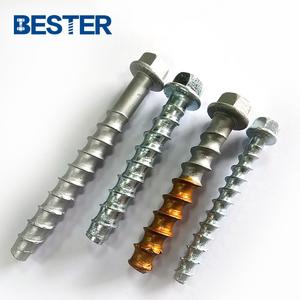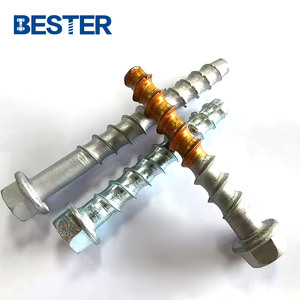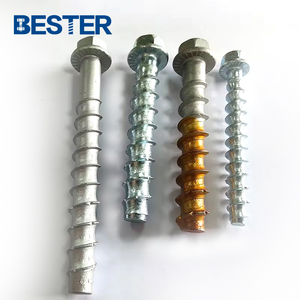
All categories
Featured selections
Trade Assurance
Buyer Central
Help Center
Get the app
Become a supplier

(13416 products available)














































Nylon anchors come in various shapes and sizes. Each serves a particular need. Knowing these types helps one choose the right anchor for different tasks.
Expanded Nylon Anchor
This is one of the common types used in the industry. Expanded nylon anchors work on concrete and masonry walls. When a screw is inserted, the anchor expands. It creates a tight grip in the base material. This feature makes them ideal for hanging items like shelves or picture frames.
Winged Nylon Anchor
The winged nylon anchor has small wings on the anchor body. These wings fold until the anchor goes inside a drilled hole. Once the anchor is in place and the screw is used, the wings expand against the walls. This action provides a strong load-bearing surface. This type is great when one needs heavy-duty support.
Toggle Nylon Anchor
The toggle nylon anchor is specially designed for hollow walls. It has a spring-loaded toggle that opens inside a wall cavity. Once the screw is tightened, the toggle flattens against the wall's back surface. This feature spreads out the load. It reduces the chance of the anchor pulling through the wall.
Cone Locking Nylon Anchor
This nylon expansion anchor features a cone locking mechanism. It provides a reliable and durable fixing point. The design not only ensures a tight fit when the bolt is inserted but also distributes stress evenly across the anchor. It prevents any chance of loosening over time. This compact and efficient anchor performs well across various construction and installation tasks.
Nylon wall anchors come with many important features. These features impact the anchor's overall function and performance.
Load Capacity
The load-bearing capacity of nylon anchors is critical. It determines the weight they can support without failing. A good-quality anchor has a higher load capacity. It makes it suitable for heavy items like shelving, lamps, or electrical installations.
This is especially vital in construction where safety standards are a priority. Always check the manufacturer's specifications. It ensures the anchor meets the required load demands of a particular project.
UV Resistance
Most nylon anchors display great resistance to UV rays. It prevents them from becoming brittle over time. This factor keeps them functional in outdoor settings. Anchors exposed to direct sunlight need good UV protection. Otherwise, the harsh weather will degrade the nylon material.
Temperature Tolerance
Good-quality nylon anchors can tolerate a wide range of temperatures. It keeps them suitable for many environments. Extreme heat or cold may affect some anchors. It's crucial to check if the location for use will see heat waves or snow. That way, one can ensure the anchor survives the weather and functions properly.
Impact Resistance
The ability to withstand sudden shocks or loads defines the term impact resistance. Good-quality nylon anchors have this property. They are ideal for places like warehouses or factories. These areas often see heavy equipment or high foot traffic.
Simple Installation
Nylon anchors have a simple design. It makes them easy to install in many applications. They are often designed to be used with standard drills and tools. This factor saves time. Users also appreciate their straightforward installation process in construction and DIY projects.
Nylon anchors are flexible and useful in many places. Here are some of their uses in different settings.
Home Improvement
These anchors are great for hanging items in the house. From pictures to shelves, nylon anchors make sure everything stays in place.
They work well on drywall and other materials. It means one can confidently add decor or install new cabinets without worrying about things falling down.
Signage Installation
These anchors work with most commercial signage. They securely attach signs to walls or posts. Nylon anchors ensure the signs stay visible and upright.
This stability is crucial for both visibility and safety. It also prevents constant maintenance or reinstalling signs.
Electrical Work
In electrical settings, nylon anchors hold conduit and cable management systems. They keep cables organized and safe from damage. Electrical cables need a sturdy base to prevent tangling or hazards. These anchors provide that support.
Automotive Applications
Vehicles rely on many parts. Some of these parts include fasteners and anchors. These parts ensure everything works smoothly.
In automotive settings, nylon anchors secure lightweight components. They include interior panels or trim pieces. It reduces the chance of rust, which is common with metal fasteners.
Outdoor Equipment
For gear exposed to the elements, durability is key. Nylon anchors are perfect for securing tents, tarps, or outdoor gear.
They resist weathering. It makes them ideal for camping or outdoor events. It gives peace of mind that the gear will stay put, rain or shine.
Selecting a nylon expansion anchor requires several considerations. Each consideration ensures the anchor performs well for its intended use.
Load-Bearing Capacity
Always check the anchor's load capacity. This capacity measure how much weight the anchor can handle. It is important to pick the right anchor for the job. A shelving unit requires the anchor's weight to be sufficient to hold heavy items.
Base Material Compatibility
These anchors work on varying base materials. They include concrete, brick, or drywall. Choose an anchor that matches the base material. It guarantees a secure installation. Using the wrong anchor can lead to poor performance or even failure.
Expansion Mechanism
The expansion mechanism refers to how the anchor grips the base material. Some anchors expand more than others. It gives them options for different applications. Select one with a proper mechanism. It ensures it meets the project's requirements for load-bearing and structural support.
Ease of Installation
Most nylon anchors are easy to install. It saves time during projects. However, checking whether the installation process requires special tools or skills is important. The last thing one needs is a complicated process when handling simple tasks.
Environmental Resistance
If the anchor will be exposed to outdoor elements, choose one with UV or weather resistance. Anchors without this feature will deteriorate fast if left outdoors.
Here are some maintenance and repair tips for these anchors.
Visual Inspections
Regular inspections of the nylon anchors help detect any wear or damage. One should check for cracks, deformation, or fading. It usually indicates UV exposure.
These signs may compromise the anchor's integrity. Catching wear and damage early helps prevent anchor failure. It also ensures the mounted items remain secure.
Regular Cleaning
This cleaning helps prevent build-up from affecting the anchor's performance. Debris, dust, or chemical residues may weaken the anchor over time. One should gently clean the anchors with soapy water.
A stiff brush will do as well. Avoid harsh chemicals. They damage the nylon material and reduce the anchor's lifespan.
Monitor Load Conditions
Be mindful of the weights supported by nylon anchors. Constant overloading can lead to anchor failure. It is advisable to redistribute weight across multiple anchors when mounting several items.
This action reduces the stress on a single anchor. It prolongs the lifespan of each one.
Repairing Damaged Anchors
A nylon anchor cannot be repaired once it has signs of severe damage. Removing compromised anchors is essential. After removing them, replace them with new ones. It will restore the secure installation.
Check Hardware Tightness
Regularly check the screws or bolts fastened in nylon anchors. Hardware loosening causes a decrease in holding capacity. One should tighten any loose fasteners. It ensures the items mounted stay secure and stable.
A1: Yes. Nylon anchors have resistance to UV light. It protects them from degradation due to prolonged sun exposure. They are ideal for outdoor applications. The sun's rays won't wear them out. It also makes them a reliable choice for patio or garden installations.
A2: The base material has the final say on which type to go for. Expanded anchors are good for solid surfaces. Winged and toggle anchors work well on hollow materials like drywall. Cone locking anchors are great for heavy loads.
A3: These anchors have a good tolerance for heat. It makes them suitable for hot environments. They will, however, lose their load capacity if exposed to extreme temperatures for too long. It is always advisable to check the manufacturer's guidelines.
A4: Yes. Their versatility allows them to be used indoors and outdoors. Indoors, they are perfect for mounting items on walls. Outdoors, their UV resistance comes in handy. They work well even after several seasons outdoors.
A5: Regular inspection and cleaning keep them in good shape. One should check for any signs of wear or damage. Clean them occasionally to remove debris or dust. This action ensures they last as long as possible.